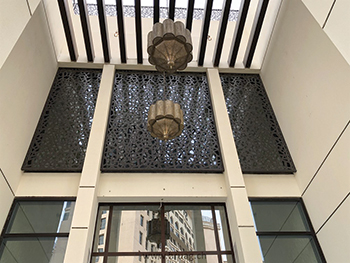Bruag panels add aesthetic appeal
01 October 2019
Bruag from Switzerland combines function and aesthetics to offer sliding systems in more than 100 proposed designs for doors, windows and openings that can be mixed with elements such as glass, for both interiors and exteriors.
Customers can also create a perforation pattern themselves should Bruag’s designs not be to their fancy. With Bruag, the only standard is that there is no standard, Markus Bruehwiler, CEO and owner of Bruag, tells Gulf Construction magazine.
He says: “Customised designs are usually not more expensive than choosing perforated designs (mashrabias) from our list. Designs by customers are categorised One to Five according to the complexity for laser cutting.”
In particular, Bruag’s weatherproof perforated Cellon panels in individual designs can be used almost anywhere, as seen at two projects in the Middle East– a hotel complex in Doha, Qatar; and a private villa in Dubai, the UAE.
According to Bruag’s regional manager for Middle East Abi Moseley, Cellon is a high-pressure laminate panel (HPL) made of 70 per cent cellulosic web and 30 per cent phenolic resin. It is moisture-resistant and does not exhibit any signs of embrittlement over its lifetime of use, which constitutes a further advantage over conventional fibre-cement panels. Cellon expands by no more than one part per thousand, she says.
The panels come in 6-, 8- or 10-mm thickness and are lightweight. In fact, a plain panel is 14 kg/sq m, and only about 9 kg/sq m with a perforation.
Installed in front of glass, the Cellon panels are produced according to customers’ individual designs or one of Bruag’s mashrabia proposals and are available in more than 3,000 colour shades to create a very special ambiance.
“On one hand, the panels are welcome shading screens and, on the other hand, they guarantee uniqueness while combining functionality with aesthetics,” Moseley says.
“The atmospheric play of light and form in combination with glass, which is triggered by the perforations, does not only produce an effect in the outdoor area. But the rays of light make their way through the different forms into the interiors, where – depending on the position of the sun and the time of day – unique images are created,” she explains.
Almost as remarkable as the aesthetics are the functional features of the Cellon panels, Moseley points out. Different to aluminium, for example, Cellon shows no signs of corrosion even in the presence of humidity and is much lighter than aluminium sheets and thus also easier to install, she adds.
“Be it in hotels, restaurants, malls or private villas, functionality, affordability and individuality aspects are in demand worldwide,” she says, adding that the fact that every panel made by Bruag is individually laser-cut means they provide a unique ambiance.
The panels are delivered ready for assembly, which includes holes and recesses.
The elements are coated in one of more than 3,000 available ultraviolet (UV)-resistant colour tones. The edges of the panels are also coated in the client’s choice colour.
Bruag can produce large format panels, whereby it calculates the net amount used. The customer does not pay for wastage or pay anything extra for predrilled holes.
Bruag has already completed a number of interesting projects around the world including the Middle East.
In addition, Bruag offers new metal construction for balcony claddings with its Cellon as fillings that easily combines aesthetic and functionality.
Users can either choose from over 100 proposed perforation patterns by Bruag or make their own forms and colours to suit their individual design as the possibilities with the semi-transparent Bruag balcony claddings and the newly developed module metal construction are nearly unlimited, says Moseley.
With this new system, metal construction teams can fix Bruag balcony claddings in a short time and thus improve cost-efficiency.
The cladding comes in stainless steel or powder-coated forms.
- Facades soar to heights of sophistication
- Reynaers secures key ‘green’ certifications
- Bruag panels add aesthetic appeal



